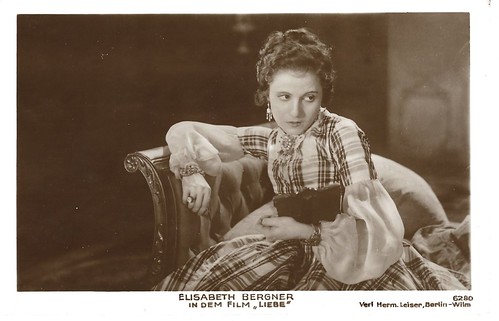
German postcard by Verlag Hermann Leiser, Berlin, no. 6280. Photo: Phoebus-Film. Elisabeth Bergner in Liebe/Love (Paul Czinner, 1927).

German postcard by Verlag Hermann Leiser, Berlin, no. 6282. Photo: Phoebus-Film Elisabeth Bergner in Liebe/Love (Paul Czinner, 1927).
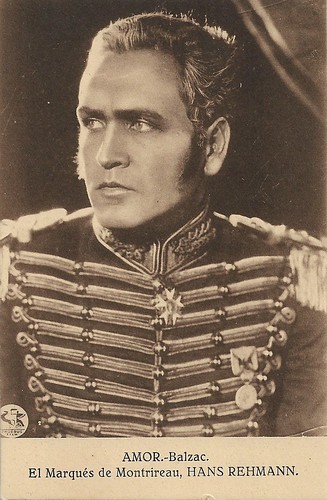
Spanish postcard by Grafos, Madrid. Photo: Phoebus Film. Hans Rehmann in Liebe/Love (Paul Czinner, 1926).
True love awakens
Elisabeth Bergner plays in Liebe/Love (1927) the headstrong, seductive, and tragically fallible Duchess Antoinette de Langeais, a lady of Parisian society, in the mid-19th century.
Antoinette coquettishly plays with the Marquis of Montriveau (Hans Rehmann), a high officer who is in love with her.
When he realises that he is being made a fool of, he gives her the cold shoulder. And now true love awakens in the Duchess. She writes passionate love letters to the Marquis and compromises herself in public to win him over.
She even enters his apartment disguised as a maid, and when she finds her letters there unopened, she goes to a convent in despair. Only now does the Marquis realise that the Duchess really loved him.
After years of searching, the Marquis tracks her down in the convent. Faced with the decision of betraying God or her love, she chooses death.
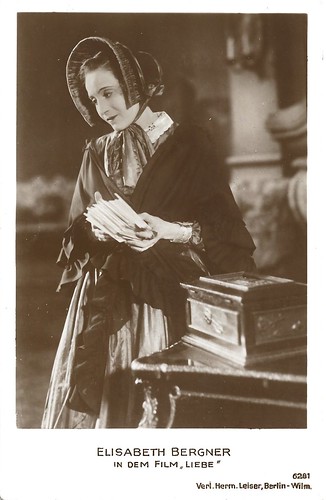
German postcard by Verlag Hermann Leiser, Berlin, no. 6281. Photo: Phoebus-Film. Elisabeth Bergner in Liebe/Love (Paul Czinner, 1927).

German postcard by Ross Verlag, no. 1655/2, 1927-1928. Photo: Phoebus-Film. Elisabeth Bergner in Liebe/Love (Paul Czinner, 1927). Collection: Marlene Pilaete.
The secret of her success
Liebe (1927) was made in the autumn of 1926 in the Staaken film studios. The six-act film with a length of 2697 metres had its premiere on 3 January 1927 and was awarded the rating "Volksbildend Künstlerisch".
The Swiss theatre actor Hans Rehmann made his film debut here as the Marquis of Montriveau, knave of Elisabeth Bergner's Duchess. Hermann Warm designed the film sets, which were executed by Ferdinand Bellan. Ilse Fehling created costumes, that rather look like the 1860s than 1830s.
Reviews in Germany were ecstatic, with most newspapers commentating on the prolonged ovation during the opening, when Bergner wasn’t allowed to leave the stage. "The way this soulful artist allows us to experience a fate in the film Liebe is a new proof of her high art." (Vorwärts, January 1927), "Elisabeth Bergner is the beginning, middle and end of the play ... she is a human being: tormented and cheerful, dark and alluring, a whimsical, an unpredictable enchantress. That is the secret of her success." (8 Uhr-Abendblatt, January 1927),
"Elisabeth Bergner delicious in appearance and movement. A wealth of emotion shines and plays against the rigid uniformity of Hans Rehmann, the antagonist of fate." (Berliner Tageblatt, January 1927), "From the scene where Bergner, wrapped in her cloak and shivering, waits for her lover on a nightly street, the scene at the bars of the monastery has not much equal in dramatic strength. And when she sinks down in front of the crucifix, this real tragedy of love dissolves into a deep minor chord that resonates in the heart for a long time ..." (Lichtbild-Bühne, January 1927),
"It was more than a great film success, it was the breakthrough of a special German film, not to be imitated in any country, and therefore effective in every country. The film is not German because of its subject matter. (...) This film is German because it juxtaposes the language of the German fairy tale with something organically equivalent." (B.Z. am Mittag, January 1927), "Bergner has wonderful scenes. Inimitable, how she starts a conversation. Or she plays with a cat. Or romps around the room. Or costars with him, the tall man in love." (Film-Kurier, 1927).
In subsequent discussions of Liebe/Love, the film was less appreciated and for decades, Liebe/Love remained one of the least appreciated of the Czinner-Bergner collaborations. Jay Weissberg presented the film in 2018 at Le Giornate del Cinema Muto and wrote in the festival catalogue "When viewed through a Balzac lens the film is ripe for re-evaluation". He cites the French critic Henry Poulaille, who wrote in 1928: "We may add that this lovely film comes at the right time. It is a respectful nod by one of the young masters of the universal language that is Cinema, to the great Balzac, his senior, who also, with his pen, addressed the universe."
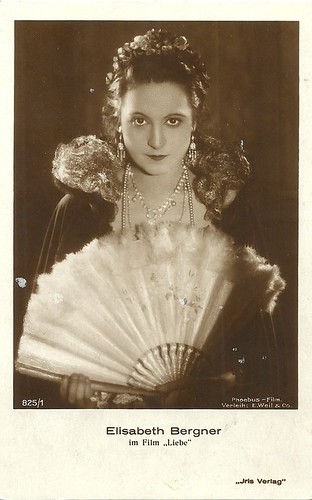
Austrian postcard by Iris Verlag, no. 825/1. Photo: Phoebus-Film / Distr. E. Weil & Co. Elisabeth Bergner in Liebe/Love (Paul Czinner, 1927).
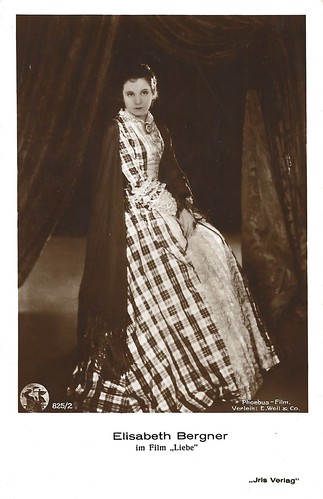
Austrian postcard by Iris Verlag, no. 825/2 Photo: Phoebus-Film / Distr. E. Weil & Co. Elisabeth Bergner in Liebe/Love (Paul Czinner, 1927).
Sources: Antti Alanen: Film Diary, Filmportal.de (German), Wikipedia (German) and IMDb.
No comments:
Post a Comment